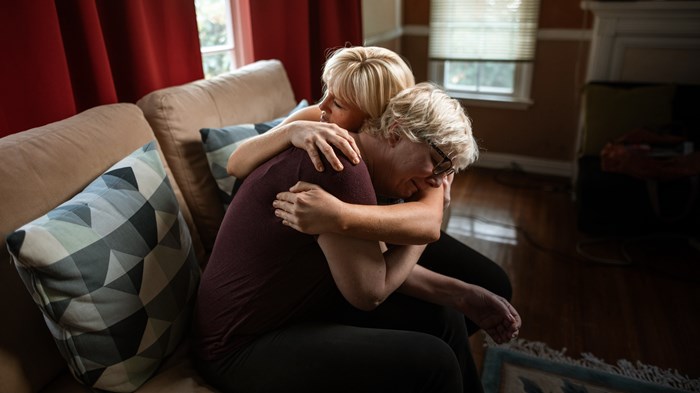11 Things Not to Say to Someone Who Is Hurting

To say that the past few years have been full of trauma and difficulty is, well, an understatement.
While the world collectively endured griefs and pains of all different shapes and sizes thanks to a global pandemic, all the while individual life was just as hard. People still lost loved ones. People still faced disappointments. Life didn’t turn out the way so many of us had envisioned – and that is all on top of the shifts brought on by a worldwide disruption.
As believers, we are called to be a place of comfort. “Mourn with those who mourn,” Romans 12:15 tells us. And yet, nothing seems harder than sitting face to face with someone who is grieving or struggling as their life unfolds in a way they never expected or imagined. Even if we have known grief ourselves, it is still difficult to know how to care for others in their heartache.
There is no better biblical example of how our words can be stinging rather than a salve than in the story of Job. After losing his children, his wealth, and his health, his friends immediately showed up and cried with him. In fact, when they initially realized the depth of Job’s pain, they actually mirrored him—wailing and mourning beside their friend.Neuroscience reveals that our brains cannot handle seeing someone who is hurting and therefore, we will naturally tend and bend towards saying something that we think will offer consolation, something we believe will fix them, or balance the scales of their grief. When, all too often, the words we speak end up adding more pain, rather than subtracting it.
But then, they opened their mouths.
When they tried to explain his pain, they turned from being comforters into perpetrators of hurt.
At one point in their long-winded explanations and blame-game, Job exclaims, “…you are miserable comforters, all of you (Job 16:2 NIV)!” How many of us can relate to that? We have been in the lowest point in our lives, only to have a well-meaning friend compound our hurt with poor reasoning, or some pithy platitude.
But, if we’re honest, we’ve all be that friend too. It’s not that we intend to do harm, but intention does not always matter; the discomfort of being confronted with someone else’s hurt—hurt, that we know we cannot take away –can lead us to feeling helpless. So we fill that sense of powerlessness with empty promises.
It can be a challenge know what to say to a person in pain, but there are a few things that most of us can agree are not helpful:
At least…:
While you may be trying to find a “bright side,” what most hurting people need, especially in those early moments of grief or pain, is to just feel the hurt. Starting a sentence with “At least…” tends to minimize their current feelings or reality.
Everything happens for a reason:
This old adage may in fact be true, but in their hurt, people don’t need a platitude to wash away their pain.
God needed an angel:
Sometimes we seek to try to explain pain with unbiblical and bad theology. God doesn’t need angels. People don’t become angels in death.
Time heals all wounds:
While time can bring healing, there are some wounds such as the loss of a loved one that are chronic. Healing can come, but the pain may be felt over a lifetime.
You can have another child/get another job/_________:
Like “At least,” this one seeks to minimize pain as quickly as possible. We must allow people mourn losses in real time.
Shouldn’t you be over this by now?:
Grief has no timetable. So much of how people respond to their hurt is connected with past traumas and pains. Grief is something we must learn to carry, not get over.
You need to move on:
Moving on insinuates that certain things shouldn’t hurt anymore. But there are some aches that we cannot move on from. With God’s help and with the help of safe, supportive community, we can choose to move through.
I understand what you’re going through:
None of us can truly understand what another person is going through and so often, this line sends the message that we are comparing our grief to theirs.
God’s in control:
Even though it is true, discussions of God’s sovereignty may not be helpful in the raw wounds of another.
You have to be strong:
Often times by strong we mean “visibly okay” and we unknowingly encourage others to stuff their true feelings and grief, rather than expressing it in a healthy way.
Just don’t think about it:
When another person’s life has changed, it is nearly impossible (and unhelpful) to tell them to just not think about it.
The hard part, even with a list like the above, it can feel like you can’t win when it comes to helping a person in pain. It can feel like saying anything will just add more hurt and so the best course of action is just to avoid the person, but that will make an isolating situation feel even more so for them.
So, what can you do for the person who is hurting? Check back tomorrow for part two of this post.
Pastors Brian From and Aubrey Sampson host The Common Good podcast Monday through Friday from 4 to 6pm (CT) on AM1160 Hope for Your Life. Aubrey is the author of The Louder Song: Listening for Hope in the Midst of Lament and the upcoming Known: How Believing Who God Says You Are Changes Everything. Brian leads Four Corners Community Church in Darian, Illinois. They are passionate about civility, compassion, and unity in a divided world.
The Better Samaritan is a part of CT's
Blog Forum. Support the work of CT.
Subscribe and get one year free.
The views of the blogger do not necessarily reflect those of Christianity Today.






















